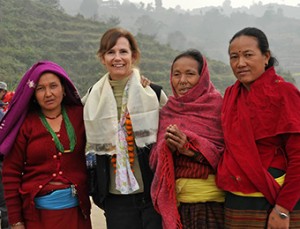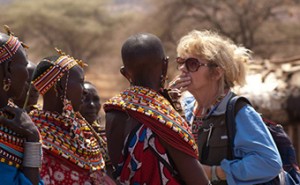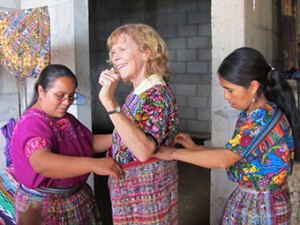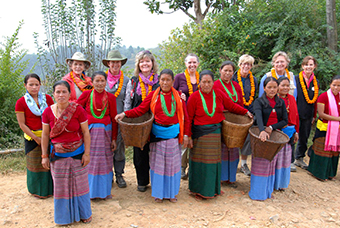
Travel Tales: Is this the best way to spend your money? It depends
One of our members questions why we offer costly travel programs when that same money could go so far to support our programs. Patricia Andersson, DFW’s Travel Program Director, explores the responsibilities of privilege and the value of our trips.
By Patricia Andersson
“Am I alone in wondering whether the thousands of dollars that these travel programs cost might be better spent as donations to the women we’re supporting?”
This query came into my mailbox in response to the announcement about our upcoming trip to Burma. While perhaps sent rhetorically, it’s a question I’d like to try to answer. I have asked it of myself, dozens of times, as I’ve developed the travel program over the years. Is it the right thing – when our mission is to help the developing world’s most underprivileged women and girls – to offer trips for our members to travel thousands of miles, at the cost of what is probably many times that member’s annual donations? Couldn’t that same money advance our mission more if spent on the programs instead of on travel? Shouldn’t it be used that way?
Perhaps. There’s no question that one person’s travel costs could go far for one of our programs. And everyone needs to make that choice for themselves — if someone feels that it’s right for them to donate a large chunk of money to DFW instead of traveling with that money, they should follow their heart and do so.
But perhaps not. Everyone has a right to decide how to spend their money based on their own desires and values. There is no moral imperative that all expendable income must be given away. And there is no moral imperative against traveling if a person feels drawn to do so; there is much to be gained from experiencing the larger world. Yet I don’t think it’s quite that simple. The part of me that resonates with the original question often feels a certain sense of guilt about the luck I’ve had to be born in an affluent country, and the privilege that comes with that. I know that the women I send my dollars to will most probably never have the opportunity to travel to visit me, as I have to visit them. However, privilege does not equal entitlement. Having more resources does not mean that I believe it’s fair, or that I don’t care about the imbalance this creates in the world. As John F. Kennedy said — based on a quote from the Bible — “to those whom much is given, much is expected.” So I strive to be grateful for my resources, and use them wisely. I choose to work for social justice, using the power that comes from privilege to help make women’s’ lives better around the world. This for me is my life’s work-in-progress.
So why offer travel?
Beyond any judgment or guilt (or healthy lack thereof) about how one chooses to spend their money, it’s also worth taking into account what these journeys are about. Our trips offer much more than just a getaway to a foreign country. They’re not lay-on-the-beach-and-drink-margaritas party trips (although some travelers have been known to imbibe a margarita or two, and we have certainly joined a party here and there). Mirroring DFW’s overall mission, a large aspect of traveling with DFW is educational — learning more about the women we support and the social milieu they exist in. If you ask anyone who has traveled with DFW, they’ll tell you that nothing gives the depth of understanding as directly experiencing the culture, and meeting these sisters face-to-face.
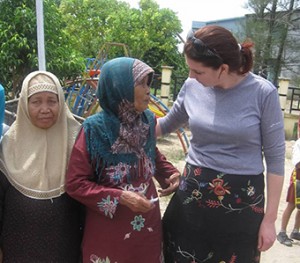
Rosalyn Burmood talks with one of the recipients of our Goats for Widows project in Indonesia, April 2013
These trips are about transformation
We also make time while traveling to focus on the impact the trip is having on us as travelers, what we’re learning not only about our destination, but about ourselves as well. If a traveler has their heart sparked by what they’re experiencing, it can change their priorities in what they do with their lives, and how they use their resources in the future. They may be inspired to tap their spheres of influence that could result in untold value for our programs and for DFW. And these are not idle hopes — these are reports of transformation directly from our travelers.
The connections we make have impact
While our travelers gain a greater understanding of the world and their place in it, the women that we visit are also impacted by our interactions. Frequently, the women we visit live in remote areas and find it unfathomable that we would choose to travel halfway around the world to visit them. It’s a revelation to them that we are even aware of their existence. Their self-worth is strengthened by knowing that we care about their struggles and are curious enough about their lives to want to come meet them in person. It’s a heart-warming connection on both sides, and often builds a stronger desire in our travelers to want to engage in this work more deeply.
Everyone benefits
Often our travelers come back so inspired by DFW and impressed with the work they have seen that they start chapters of their own, increase their donations to DFW, or join national committees where they give of their time and energy. Often they become donors to the nonprofits that we visit, or volunteer for them in an on-going way. Most stay in touch with people they met on the journey, and continue these connections long-term. All these outcomes were established through a survey of our past travelers administered last spring, and based on these results, DFW’s Board recently voted to make the Travel Program an official part of our mission. The evidence is clear – and in the words of one of our travelers, “the trip was worth its weight in gold.”
So Rita (the member who posed the original question) I do hope that you have the opportunity to travel with us one day — you may find it more worthwhile than you imagine. And if it’s not your cup of tea, I welcome you to make a big donation to DFW!
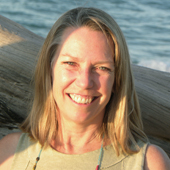 About the author
About the author
Patricia Andersson is the director of DFW’s travel program. She’s run the program since its inception and has taken DFW groups to many countries including Indonesia, Kenya, Uganda and Nicaragua. Have comments about this post? Email Patricia.

